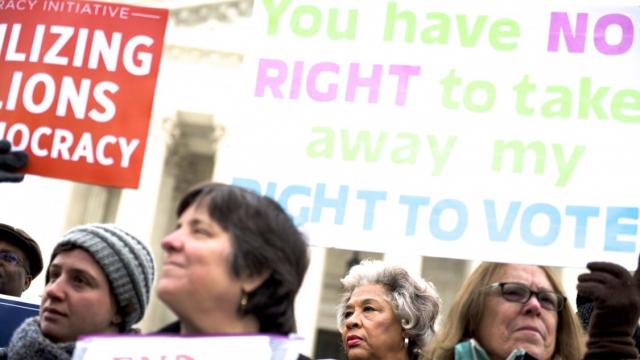
With its ruling Monday upholding Ohio’s practice of removing infrequent voters from its rolls, the U.S. Supreme Court cleared the way for the mass disenfranchisement of low-income, minority voters across the country.
In a 5-4 ruling, Justice Samuel Alito found that the National Voter Registration Act does not prevent Ohio from purging from the rolls voters who do not participate in federal elections for two years. If inactive voters do not respond to a mailer asking them to verify their address and do not vote for two more years, they are purged from the rolls.
The ruling will have implications beyond Ohio.
“Today’s decision threatens the ability of voters to have their voices heard in our elections,” said Stuart Naifeh, senior counsel at Demos, which challenged the state’s practices.
Six other states — Georgia, Montana, Oklahoma, Oregon, Pennsylvania and West Virginia — use similar practices to remove voters from the rolls if they fail to vote. A total of 17 GOP-controlled states signed onto a brief supporting Ohio’s position, indicating that they would be interested in using a similar list-maintenance procedure if it’s found to be constitutional.
With the approval of the Supreme Court, more states are likely to begin discriminatory purges like Ohio’s, and more states will likely remove a disproportionate number minority, low-income, and housing-insecure voters — people who are more likely to support Democrats. Those voters are more likely to move frequently and not respond to mailers asking them to verify their registration status.
The ACLU of Ohio noted that the ruling will “have a ripple effect across the entire country,” and other advocates warned of the impact in November.
“With the midterm election season now underway, we will remain vigilant as we expect that officials will read this ruling as a green light for purging the registration rolls in their community,” Kristen Clarke, president and executive director for the Lawyers’ Committee for Civil Rights Under Law, said in a statement.
Chris Knestrick, executive director of the Northeast Ohio Coalition for the Homeless, — an organization named as a plaintiff in the lawsuit — said the impact will be especially hard on homeless and housing-insecure Americans.
“By greenlighting Ohio’s purge process, the court allowed states to shut out the voices of these voters,” he said.
The case, Husted v. A. Philip Randolph Institute, was filed on behalf of Ohio voters like war veterans Larry Harmon and Joe Halle, who both missed elections and then were told they could not participate in subsequent ones.
Halle told ThinkProgress Monday that he feels for the people who could find out in upcoming elections that they are no longer registered.
“Today’s ruling doesn’t serve justice,” he said. “It doesn’t help better American and it certainly doesn’t help the institution of voting. It only does damage.”
Between 2011 when it implemented the policy and 2016, Ohio purged roughly 1.2 million people from the rolls for voting infrequently. Surveys of Ohio’s voting lists have found that “voters have been struck from the rolls in Democratic-leaning neighborhoods at roughly twice the rate as in Republican neighborhoods,” according to Reuters.
The U.S. Court of Appeals for the Sixth Circuit sided with the voters, saying that Ohio violated the NVRA. But in the Supreme Court’s ruling, Alito disagreed, finding that the Court has “no authority to second-guess Congress or to decide whether Ohio’s Supplemental Process is the ideal method for keeping its voting rolls up to date,” he wrote. “The only question before us is whether it violates federal law. It does not.”
In her dissent, Justice Sonia Sotomayor noted that the majority’s ruling “ignores the history of voter suppression” that led to the passage of the NVRA and will force minority and low-income voters and their advocates to be “proactive and vigilant in holding their states accountable and working to dismantle the obstacles they face in exercising the fundamental right to vote.”
“Our democracy rests on the ability of all individuals, regardless of race, income, or status, to exercise their right to vote,” she wrote.
Halle, the current mayor of Oak Harbor, Ohio and current candidate for a seat on Ohio’s state legislature, said the ruling energizes him more for his campaign.
“If the court isn’t going to balance the scales of justice, then I’ll do it myself,” he said.
Originally published by Think Progress











